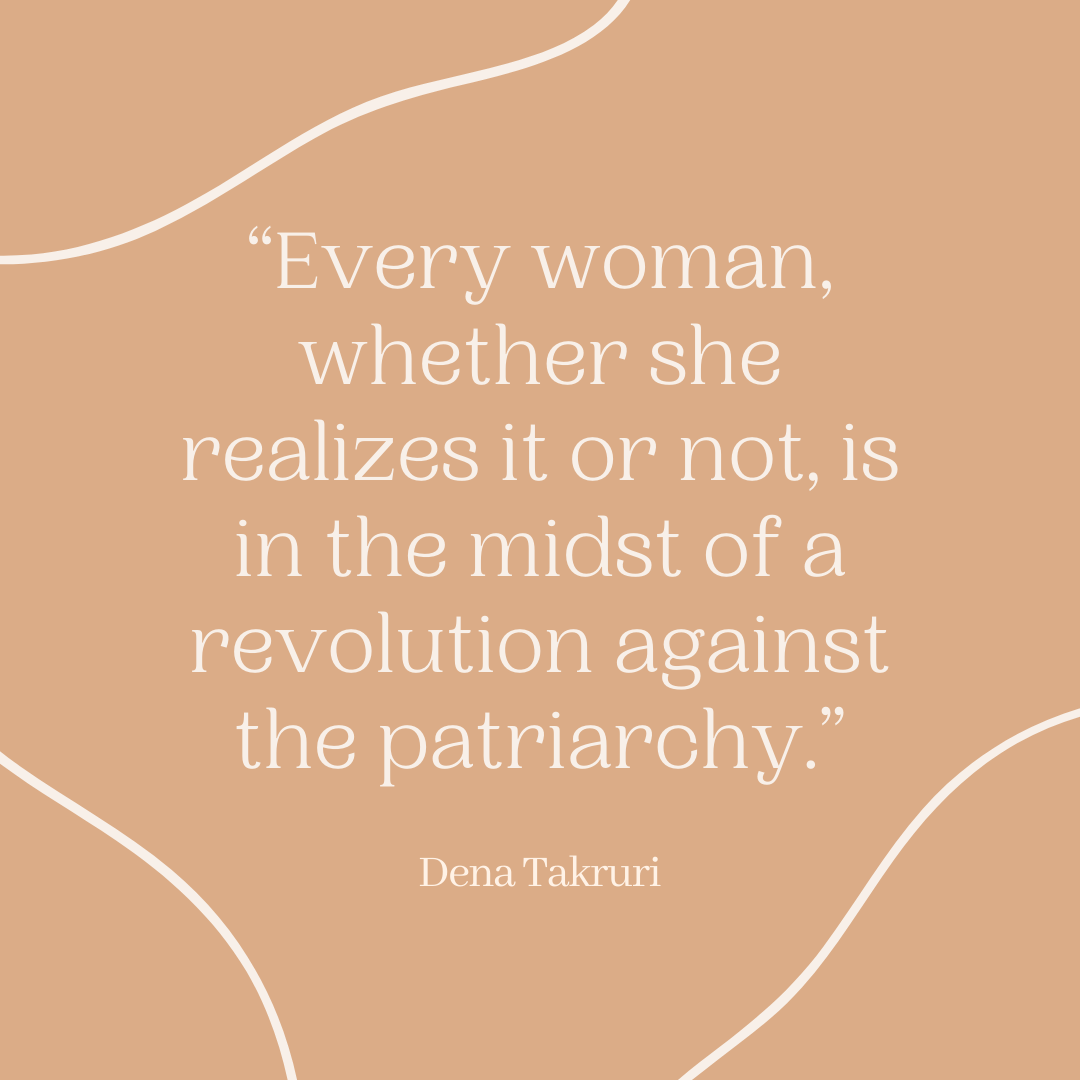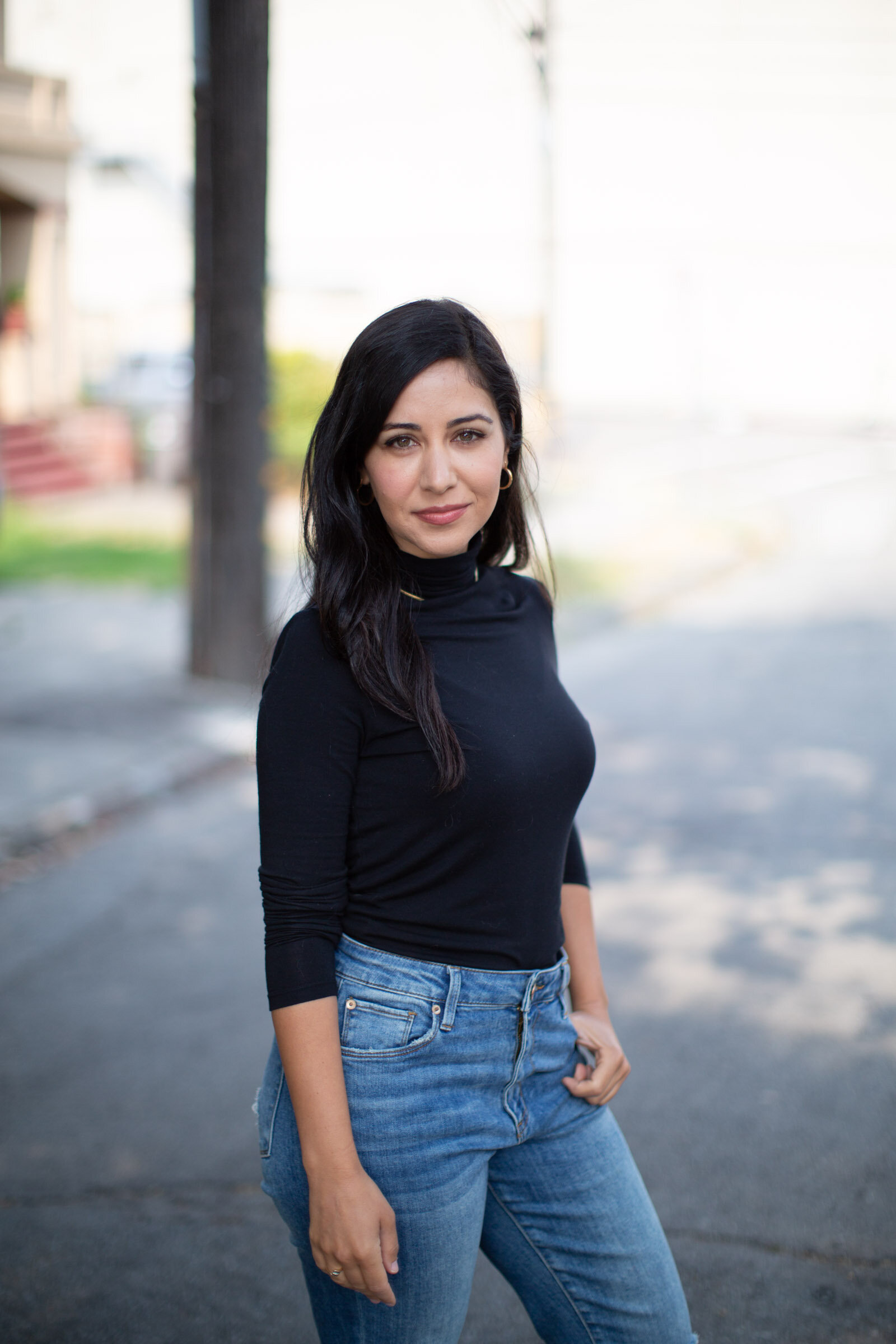By Jessica Semaan
Dena Takruri is an award-winning journalist, producer and storyteller who has built a brilliant career in digital news media. Known for her insightful video reports from conflict zones around the globe, Takruri covers the human impacts of natural and man-made disasters. She has reported on the devastation from wildfires in Northern California, hurricanes and environmental conditions in Puerto Rico, and the coronavirus pandemic’s toll in San Quentin prison. Curiosity, empathy and grit are her signature traits as a reporter. We are excited to share this very personal interview with Dena Takruri.
Journalist Dena Takruri sits down for an interview with Seismic Sisters.
Photo by Tumay Aslay.
What inspired you to take the journalist path?
My desire to become a journalist was very much shaped by growing up Muslim and Arab in the U.S. and seeing the absence of fair representation of my communities. I grew up in a home where my Palestinian immigrant father basically had the news on 24/7. He was constantly monitoring the situation in Palestine because his plan had always been to pack up the family and move us “back home” once there was peace. Of course that never happened. What did occur instead was that I got an early crash course in media literacy. I observed how my people were regularly demonized and dehumanized. The basic denial of my people’s humanity motivated me to want to work in the media to reclaim our narrative and carve out a space to have a voice without having to compromise who I am. It fueled the fire to want to amplify the voices of the voiceless and speak truth to power. I’ve also always been a highly inquisitive person who asks a lot of questions. My parents jokingly nicknamed me “the FBI” when I was a child because of how many detail-oriented questions I used to ask about everything. I’ve always been curious about the world and love learning people’s stories, which made journalism a natural fit.
What has it been like to be a prominent female reporter in a male dominated space?
There are many challenges but also certain advantages to being a woman in this space. As is the case in most professions, discrimination exists. I remember pretty early on in my reporting career, a male manager passed me up on an assignment to cover a story about a far right movement in Europe and opted to send a male colleague instead. When I asked him why he didn’t send me and if there was anything more I could do to be considered for such opportunities, his reply was, “this story is gritty - it needs a man.” It was a slap in the face, but I’m proud to have later gone on to report from various conflict zones and found myself in many a dicey situation that demonstrated my grit. That said, after his comment, my femininity became something I grew self-conscious about while reporting in the field. I sort of internalized the idea that dressing a certain way or having too much makeup on could be disqualifying. I have to make considerations about my appearance that my male counterparts never have to think about. The rampant objectification I experience from men who comment on my videos online is another constant challenge, and one that’s been very demoralizing. I want to be judged by the quality of my work and the stories I’m telling and not by how I look. Unfortunately the internet can be a very degrading and hostile space for women in that regard.
Despite all that, I think that being a woman has been a huge asset to my success. Having compassion, empathy and emotional intelligence are intrinsic to who I am as a woman. And they’re qualities that are necessary to have while reporting, especially as I’m often meeting people during the most traumatic moments of their lives. I’m able to forge a connection with them that makes them feel safe to open up, be vulnerable and many times cry as they’re sharing their stories. I’ve also found that powerful men and/or men from the opposite side of the political spectrum are more inclined to talk to me because they’re disarmed by the fact that I’m a woman. That’s fine by me because it just makes it easier to hit them with the hard questions!
I’ll add that while the news landscape is certainly male (and white) dominated, it is in fact changing. That’s in large part thanks to movements like Me Too and Black Lives Matter which have drawn attention to systemic inequalities and have opened the way for necessary critique and change. There are conversations taking place within newsrooms now that would have been unimaginable just a few years back. My experience at AJ+, though, has been refreshingly unique in that my top boss, Dima Khatib, is a strong Palestinian woman who has worked to ensure that other women are empowered and thrive.
What about your journey as a journalist do you feel most proud of?
I’m most proud to serve as a role model to younger women and girls from my community. It’s very humbling to hear them say that I’ve inspired them to speak out, or be brave enough to follow their dreams, or embrace their (Palestinian/Arab/Muslim) identity, especially as I remember how isolating it felt to grow up with virtually no role models who looked like me. One of the most touching moments I experienced was after I gave a speech at a Muslim American gala event. A college student came up to tell me that her father had been unsupportive of her desire to major in political science and was encouraging her to pursue something more “practical” like medicine and engineering instead. She said she played some of my videos for him, which changed his mind and made him get on board. I was really moved by that.
How does your identity of being Palestinian American influence the work you do and topics you cover?
I was born and raised in the U.S. but grew up visiting my relatives in the Occupied West Bank very regularly. The experiences of living under a military occupation with checkpoints, curfews, strip searches and the overall lack of freedom were transformative and shaped my political consciousness. Being Palestinian gives you a very personal and intimate understanding of injustice. I know what it means to be criminalized and dehumanized on the basis of your ethnicity and how it feels to be dispossessed from your land due to ongoing settler colonialism. It’s enabled me to connect the dots between the systems of oppression faced by other communities, whether we’re talking about Black Americans, Indigenous folks, or the undocumented. I’m driven to tell the stories of marginalized communities and people fighting for equality and self-determination and select my stories first and foremost through the lens of social justice.
What are forms of self-care you practice?
I adopted a kitten two years ago and found that his companionship is very calming and healing and also brings me so much joy. I named him Shams, which is the Arabic word for sun and also the name of Rumi’s spiritual instructor and companion. My Shams has shown me that pet therapy is real! I also love riding my bike and dancing. Getting out of my head and into my body as much as possible is good for me as I tend to be anxious and overthink things. Reading and listening to audiobooks is another big self-care practice for me. And finally, knowing when to unplug from the news and social media is a form of self-care that I have yet to master but am steadily working on. It feels more imperative now than ever.
Dena Takruri, Journalist, Host and Producer. Photo by Tumay Aslay.
What advice do you have to give for young women wanting to use their voice for change but who are afraid?
You’re not alone. Patriarchy was designed to silence us, and that's exactly why we need to summon the courage to speak up and speak out. Every woman, whether she realizes it or not, is in the midst of a revolution against the patriarchy. It doesn’t matter whether she’s fighting for the right to vote, equal pay, autonomy over her body or the freedom to do or wear what she wants without getting catcalled, harassed or even worse. Every time a woman chooses to use her voice to stand up for herself, it benefits the rest of us. We’re living in a unique moment where we’re witnessing the power that social movements have to disrupt the status quo and aggressively push for gender, racial, and socioeconomic equality. These movements wouldn’t be around had women not used their voices to advocate for change.
That said, we must also be mindful of the fact that it’s inherently riskier for some women to speak up. Women of color, queer and transgender women, women who are less educated, and women of lower socioeconomic status are especially vulnerable. That’s why it’s incumbent on all of us, particularly those of us with more privilege, to support them with true allyship.
Twitter: @Dena
Instagram: @denatakruri
Journalist Dena Takruri. Photo by Tumay Aslay.
A note from the interviewer.
Before I met Dena Takruri at an Arab Film Festival event, on whose board she was serving, I had watched many of her intelligent, captivating AJ+ viral videos on topics ranging from systemic oppression in the U.S. to the Israeli occupation in Palestine, read interviews with her online, and kept up with her Facebook page. Suffice to say, as an Arab woman myself, I was fascinated and inspired. The day I finally met her in real life, I almost fangirled her and asked for an autograph, until I remembered that I was also on the board of the Arab Film Festival, and we have friends in common who were present. Avoiding embarrassment, I went up to her and asked awkwardly for her name, trying to play it cool.
With time, and later a pandemic lockdown, we have become friends and I have gotten the privilege to know Dena Takruri behind the cameras and away from the noise of reporting zones. I got to see her deep care for the causes she reports on. I saw her attention to detail in everything she takes on. I saw her endless curiosity about humans, their stories, what drives them and even how could she help them. I witnessed her undying loyalty to her friends, family, community and her Palestinian roots. Dena's identities of journalist, activist, American, Palestinian, woman and human all are integrated and aligned around her core values. The Dena in front of the camera is the same as Dena behind the camera. She is the real deal. She is the authentic deal. And I am excited for you to get to know her too.
Jessica Semaan
Jessica Semaan is a freelance writer, book author, poet and performer. Chronicling her journey of healing from trauma, she has over 50,000 people following her writing on Medium. Jessica’s debut book Child of the Moon was published in 2018. She also is studying to become a psychotherapist.
The views, practices, information and opinions expressed in this article are those of the individuals involved in the article and do not necessarily represent those of Seismic Sisters.





